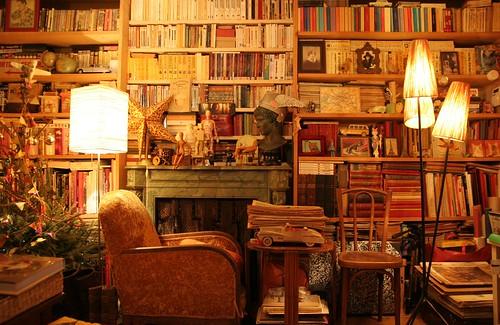Aaliyah,
the unnecessary woman of the title, is alienated from her family, rejected by
her impotent husband, a single childless woman in a society not fond of
divorced, childless women. She lives alone in Beirut in an apartment which her
family think she doesn’t deserve.
Aaliyah’s
secret passion, which gives her reason to live, is translating books into
Arabic, a seemingly unnecessary task since no one gets to read the works. She
stores them in boxes in the maid’s room and bathroom. “I create and crate,” she
says wryly. “It is the world outside that box that gives me trouble.”
Every
year on New Year’s Day she starts a new translation. “Beginnings are pregnant
with possibilities,” she observes. She is 72 years old and has about 37
translated works boxed in her apartment.
The
novel starts with her staring into the mirror at her hair which has turned blue
after she rather vigorously shampooed it, using ten times the amount prescribed
on the label on the shampoo bottle … “Reading instructions happens not to be my
forte..” She'd overheard her neighbours (who she calls the witches)
discussing the “unrelenting whiteness” of her hair.
She
is alone…a choice she made with few other options available… “Still I made my
bed – a simple comfortable and adequate bed, I might add.” But how adequate can
it be when she seems to stand on the outside of society eavesdropping on her
neighbours, engaged in the pointless activity of translating famous books that
no one will read. Why does she do it? For the sake of art?
Throughout
the book she offers her musings of Beirut present and past on literature, philosophy and art and on her life, constantly reminding us that her name means
“above,” or “the one on high.” But Aaliya does not feel at home in her native
city. For most of the novel, she walks through her neighbourhood in West
Beirut, remembering how it used to be her beloved Beirut, now battered by
decades of war. Beirut - “the Elizabeth Taylor of cities,” she calls it,
“insane, beautiful, tacky, falling apart.”
She is
now retired after spending her working life in a small, poorly-frequented book
store where she got to know the only two people who have meant anything to her: Ahmad,
the young boy who volunteered in the bookstore just so he could read, and Hannah,
her closest confidante, who imagined herself engaged to a young lieutenant she
met in a taxi.
She
admires the works of the 17th century philosopher Spinoza,
identifying with his story and his life; “a pathological outsider” is what
makes him her favourite. “He gave up his family inheritance and became a
private scholar, a philosopher at home … When I run across his name in one of
my readings … butterflies flap their wings about my heart as if I’ve encountered
a lost lover or rediscovered an intimate, an almost sensual experience.”
Aaliyah
invites us to think about what makes a human necessary when she relates the
story of Bruno Schulz, a Polish writer and artist, forced to relocate to the
ghetto by the Germans in 1941. Felix landau, a Gestapo officer who fancied himself
a lover of art, decided that Schulz was a necessary Jew and extended him
protection in exchange for painting a mural at his home. Shortly after this
Schulz was shot and killed by another officer in revenge for Landau having killed
the officer’s own ‘personal Jew’.
Her
tidy little life is interrupted by an unexpected disaster that exposes her
vulnerability to the “witches” as they help her to cope with her loss. The book
prompts the questions: how much does a life matter? What do we value in life? Is
a doctor’s life more necessary than a street-sweeper’s? Perhaps how we choose
to live our lives is what gives it meaning. This is a deceivingly simple book,
a portrait of a recluse, a meditation on an unconventional life.
 |
| photograph from the author's website |
ABOUT THE AUTHOR
Rabih Alameddine is the author of the novels The Hakawati; I, the Divine; Koolaids; and the story collection, The Perv. He divides his time between San Francisco and Beirut.














